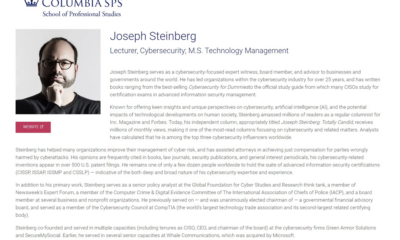Do Our Laws Prohibiting The Publishing Of Officials’ Home Addresses And Phone Numbers Actually Keep Anyone Safe?
Posting online the home address and/or home phone number of anyone serving as a judge or prosecutor, or of anyone retired from such a position, could be punishable by as many as five years in prison and a $15,000 fine, under legislation currently being considered by The New Jersey State Assembly.
The proposed law was drafted in the aftermath of the recent shooting at the front door of their home of the son and husband of Judge Esther Salas, allegedly by a deranged attorney who had previously tried a case before the judge.
Laws that restrict or otherwise govern the publication of various types of information are not new; even the freest of nations regularly mandate secrecy for their classified secrets, protect people’s healthcare data, prohibit the unscheduled and uncontrolled dissemination of corporate “insider information,” and shield various personal details of law-enforcement agents.
The proposed New Jersey law is, in fact, an extension of a law already in place to protect law enforcement officer’s personal information. And, of course, any stable society must also protect its judges and prosecutors. As such, the proposed New Jersey law seems to makes sense.
But, not all secrecy laws are equally effective in achieving their desired results; the combination of societal changes and advances in technology can both easily undermine the effectiveness of laws that worked well in the past and necessitate the adoption of new approaches to security.
In fact, it is possible that some secrecy/privacy laws currently on the books around the nation, as well as New Jersey’s newly proposed law, may prove to be not only ineffective, but also counterproductive – providing a false sense of security where there is none, and potentially both infringing en masse on people’s First Amendment rights and creating criminals out of many innocent parties.
Many of the flaws with the proposed New Jersey law are not problems only in New Jersey – they highlight problems with various laws already in place at both the federal and state level to protect law enforcement agents and others. The tragic murder of Judge Salas’s son, and the severely injuring of her husband, should serve as a strong impetus for elected officials all over to both reexamine relevant laws and to modernize them to work with the realities of the modern world; lawmakers need to ensure that we, as a society, actually deliver necessary security, rather than just offer our law enforcement and judiciary the illusion of protection.
Here are some of the reasons why the New Jersey law, and others like it, are unlikely to achieve their stated purpose:
1. When it comes to anyone’s home address, the cat is already out of the bag
Most people’s home addresses can be quickly obtained online – or at least narrowed to a small range – often with little effort. It took me less than one minute of Googling to find not only Judge Salas’ home address on multiple different websites that pull data from a variety of public records, but to find a copy of the deed to her home, her husband’s name and office address, and her late son’s name and school.
Subsequently, in less than a minute per person, I was also able to find home addresses for several current local police officers and their family members – even though such information is already prohibited by State law to be published online.
I obtained all of the aforementioned information at no cost and using no subscription-based services (neither paid nor free services that require registration).
2. The Internet is global – States’ jurisdictions are not
Many of the sites on which I found the judge’s personal information are not based in New Jersey, and are, therefore, unlikely to be subject to New Jersey law. Some of the data may not have even been physically located within the jurisdiction of the United States. And these sites were not publishing the data with malicious intent. In today’s connected world, if someone really wanted to Dox a judge how hard would it be to have someone outside the country publish everything on a server situated in a foreign country?
3. Decades of data is already online by the time the person becomes a judge or prosecutor
Nobody is born a judge or prosecutor – and people who ultimately assume such roles often have careers that create plenty of online information prior to their assumption of the roles that lead to their needing protection. Such folks also likely generate numerous public records. The information created in the years (or more likely decades) prior to someone’s becoming a judge or prosecutor can live online forever. In fact, in an increasing number of cases, various modern technologies, such as blockchain, automatic archiving, etc., make removal of such information after its initial publication exceedingly difficult, if not impossible. (Some of the information that I found on Judge Salas and the local police officers was created in public records before they assumed their respective positions.)
4. There is publicity inherent in the positions
In many cases, significant amounts of information are shared about a person as a condition of, or as a result of, that person’s becoming a judge or prosecutor – news articles, Wikipedia entries, etc. provide plenty of material that can assist a stalker to either find his.her target, or to craft highly effective searches for home addresses.
5. People are interconnected
Even if a judge or prosecutor managed to keep a low online profile, do any of his or her children, siblings, or friends use social media? Do any of his or her family members participate in sports leagues, provide information to the public about their professional lives, attend social events, or do anything that could make them appear in the news, or on a blog? Tremendous amounts of information that could aid evildoers intent on harming a judge or prosecutor, or a family member of a judge or prosecutor, can often can be garnered from such sources. Unless we expect the family members of judges, prosecutors, and police officers to be recluse hermits, there is almost certainly going to be information online that the law de facto seeks to protect.
Furthermore, is the State going to prosecute a judge’s son or daughter if they share their own home addresses and/or phone numbers, and it is self-evident from numerous websites that the same information would apply to their parent – if not, will it apply the law equally to others who do the same? (The proposed New Jersey law makes it a crime punishable by jail time to publish the information even without intent to harm – simply disregarding the risks that a post may cause can lead to 18 months in prison.)
6. Home phone numbers?!
Is there any better indication that the proposed New Jersey law is outdated, and potentially unable to address threats created by modern technology, than its inclusion of protections for home phone numbers, but not for cell phone numbers and other components of modern communication? How man people today use their home phone numbers for texting or WhatsApp, or for receiving authentication codes? Sadly, various other laws around the country are structured similarly.
7. There are many better defenses
Security devices such as cameras, fences, and alarms, along with personal safety training, are likely to offer far better protection than attempting to implement security by obscurity. Whether we like it or not, in 2020, judges and prosecutors must assume that would-be-perpetrators can find out where they live – and should act accordingly. (I will leave to others any potential discussions about the benefits and drawbacks of such folks keeping firearms at home and on their person.)
The bottom line is that in 2020 we simply cannot successfully secure public figures by trying to hide their home addresses from potential evildoers. And hiding their home phone numbers does not protect them against communication risks.
Of course, in a similar fashion to the way they address the EU’s Right to Be Forgotten, search engine providers could offer to remove certain data from their indexes, making it more difficult – although certainly not impossible – for ill-intending people to find certain personal information. In fact, as I have discussed elsewhere, the failure of the Federal Government to give Americans the Right to Be Forgotten has weakened the protections offered by other data control laws such as the Fair Credit Reporting Act.
Of course, in the case of judges and prosecutors, even the removal of data from search-engine indexes is not going to provide real security – if someone intent on committing an act of physical violence wanted to find out where a judge lives, the evildoer can simply follow the judge home from work.
As such, if we want to honor our responsibility to keep judges, prosecutors, and other officials safe, we should not be simply adding more categories of people to existing secrecy laws – we must revisit our laws and update them to work in the modern world.













 CyberSecurity for Dummies is now available at special discounted pricing on Amazon.
Give the gift of cybersecurity to a loved one.
CyberSecurity for Dummies is now available at special discounted pricing on Amazon.
Give the gift of cybersecurity to a loved one.